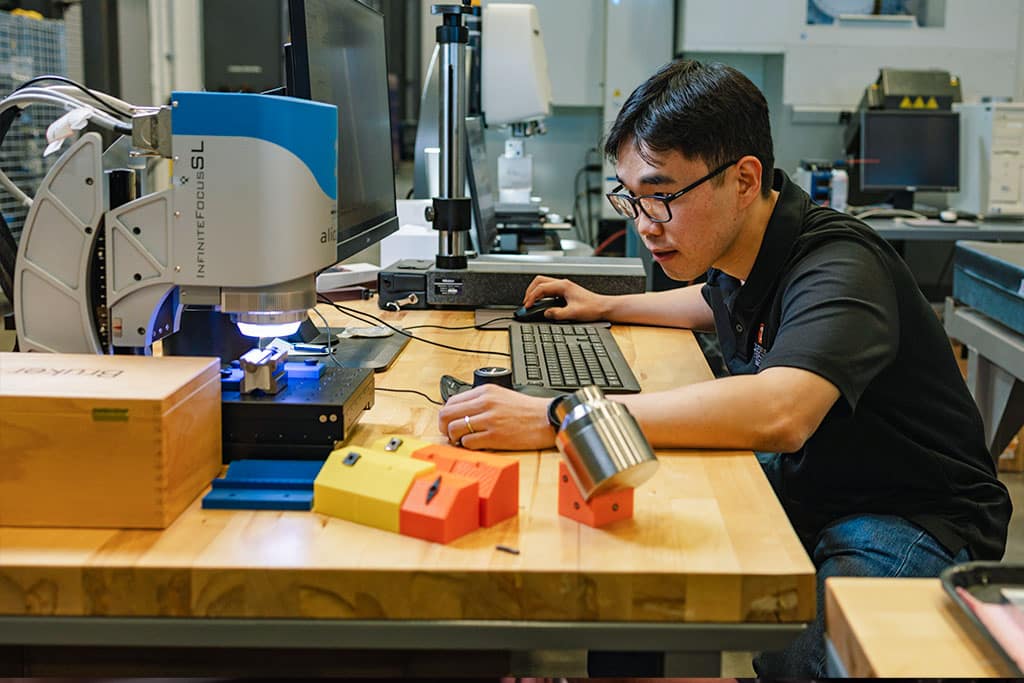Graduate Programs
Advanced Manufacturing Certificate
Interested in diving deeper into advanced manufacturing technology like additive manufacturing and robot-assisted applications? Obtaining a graduate certificate in advanced manufacturing teaches students to apply knowledge in more specific segments of this broader field of engineering, honing expertise and sharpening skills for graduates as they continue their learning experience at UT.
Program Overview
The graduate certificate in advanced manufacturing is an opportunity to obtain graduate-level education focused on topics in advanced manufacturing such as additive manufacturing (polymers, metals, and hybrids/composites), robot-assisted applications including welding, micro/nanoscale fabrication, and more.

Why get a graduate certificate?
The Advanced Manufacturing Certificate Program is taught by world-class faculty in the in our department—giving students the opportunity to learn under experts in the field as they hone knowledge and application skills in advanced manufacturing. Advanced manufacturing is a crucial field of study for the future of global industries and economies due to its transformative impact on productivity, innovation, efficiency, and sustainability.
Upon receiving their certificate, students will demonstrate the ability to apply knowledge of conventional manufacturing techniques and knowledge of how mechanics of materials affect product properties and influence manufacturability. In obtaining a certificate in advanced manufacturing, graduate students will significantly enhance their career prospects and skill set, setting them apart in a competitive market seeking forward thinkers and innovators.
Our Curriculum
The certificate program includes four graduate-level courses: two prerequisite courses and then two electives as described below. Students who complete the certificate and wish to pursue a Master of Science degree can do so using all credits earned in the certificate program.
Required Courses
ME 559 Advanced Mechanics of Materials I
3 Credit hours
Elasticity in three dimensions: equations of equilibrium, strain-displacement relations, compatibility, constitutive equations. Energy methods. Beams on elastic foundation, unsymmetrical bending, shear center, beam-columns, buckling, plastic collapse.
Cross-listed: (Same as Aerospace Engineering 559)
Recommended Background: 321
ME 566 Manufacturing Processes
3 Credit hours
Fundamental principles of the major classes of manufacturing processes, developing first order mathematical descriptions for selected processes. Comparison of advantages and limitations across various processes in terms of process quality and productivity. Application toward process selection, impact on product design, and quality control.
Recommended Background: mechanics of materials, heat transfer, materials science.
Elective Courses
ME 560—Introduction of Micro-Nano Manufacturing
3 Credit hours
Fundamentals of nanotechnology and nano fabrication, experimental methods of nano science and technology, advanced manufacturing overview, additive manufacturing (3D printing), electromechanical device fabrications, printable sensors and energy devices, biomedical printing.
Recommended Background: Engineering Mechanics (ME202), Introduction to Materials Science and Engineering (MSE201), Introduction to Chemical Research (CHEM 200).
ME 569—Principles of Additive Manufacturing
3 Credit hours
Fundamentals of additive manufacturing processes within the context of traditional manufacturing life cycle including the basics of product design, processing mechanics and materials science to highlight the advantages of additive manufacturing.
Credit Restriction: Students cannot receive credit for both 469 and 569.
Recommended Background: Computer-aided design, materials science.
Registration Permission: Consent of Instructor
ME 586—Mechanics of Robotic Manipulators
3 Credit hours
Fundamentals of robotic manipulator mechanics: kinematics and dynamics, sensors and actuators, manipulator mechanical design, and joint-level control.
(DE) Prerequisite(s): 451 and 533.
(DE) Corequisite(s): 529.
ME 599—Special Topics
1-3 Credit hours
Including Composites Manufacturing, Hybrid Materials
Repeatability: May be repeated. Maximum 6 hours.
Registration Permission: Consent of instructor.

Join Us on Rocky Top
Apply to Grad School
Ready to become an Engineering Vol? Want to learn about our admission requirements for Grad School? Use the links below to learn more about how to join our Volunteer community!
